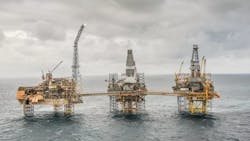North Sea Isabella appraisal well confirms hydrocarbons
Offshore staff
ABERDEEN, UK — TotalEnergies’ appraisal well of the Isabella gas-condensate discovery in the UK central North Sea has encountered hydrocarbons.
The well was drilled in 262 ft (80 m) of water on Block 30/12d-12, 105 miles east of Aberdeen and 25 miles south of the company’s Elgin-Franklin production complex.
According to partner Ithaca Energy, hydrocarbons were present in Upper Jurassic and Triassic sandstone reservoirs, with 148 ft (45 m) net thickness.
Logging while drilling and wireline logs were acquired to establish reservoir quality. TotalEnergies now plans to plug and abandon the well and assess the results to determine the reservoir’s commerciality.
Ithaca estimates the gross cost of drilling at about £66.6 million ($79.5 million).
The company has committed to drill another exploration well in the UK central sector on the K2 prospect in license P2382, which it operates in partnership with Dana Petroleum. The target lies within the Forties Member sandstones.
Drilling should start between June and July 2023 and continue for about approximately 41 days to determine the presence of hydrocarbons. Water depth is 294 ft (90 m), and the final planned depth of the well is 9,000 ft (2,743 m).
Total cost should be £17 million ($20.28 million) in a dry hole case and up to £34 million ($40.57 million) in the event of a success.
Last month the company and fellow operators bp and Equinor signed a memorandum of understanding to investigate electrification options for their West of Shetland oil and gas development interests.
This followed the formation of the West of Shetland Electrification (WoSE) group, acting on behalf of the joint venture partners in the Clair, Rosebank and Cambo fields.
Potential solutions could include importing power from shore (including from onshore wind) or from offshore wind facilities. Full electrification would require an estimated 200 MW of power.
The partners will address technical challenges presented by the fields’ remote and deepwater locations of the fields, along with commercial, regulatory and consenting issues.
WoSE group’s assessment of a hub electrification concept is said to support the aim of the North Sea Transition Authority and the UK government for domestic oil and gas production with a low carbon footprint, and the sector’s ambitions to become a net-zero basin.
A spokesperson for the group said, “This initiative seeks to evaluate the technical, commercial and regulatory challenges of various low-carbon power hub solutions to recommend a technically and commercially viable option that can meet the requirements of the three field owners within the respective project timeframes.
01.05.2023
